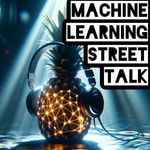Machine Learning Street Talk (MLST) – Details, episodes & analysis
Podcast details
Technical and general information from the podcast's RSS feed.

Machine Learning Street Talk (MLST)
Machine Learning Street Talk (MLST)
Frequency: 1 episode/9d. Total Eps: 221

Recent rankings
Latest chart positions across Apple Podcasts and Spotify rankings.
Apple Podcasts
🇬🇧 Great Britain - technology
27/07/2025#96🇫🇷 France - technology
27/07/2025#76🇬🇧 Great Britain - technology
26/07/2025#72🇬🇧 Great Britain - technology
25/07/2025#83🇩🇪 Germany - technology
25/07/2025#83🇨🇦 Canada - technology
24/07/2025#74🇬🇧 Great Britain - technology
24/07/2025#69🇩🇪 Germany - technology
24/07/2025#59🇫🇷 France - technology
24/07/2025#87🇬🇧 Great Britain - technology
23/07/2025#61
Spotify
🇬🇧 Great Britain - technology
27/07/2025#50→🇬🇧 Great Britain - technology
26/07/2025#50↘🇬🇧 Great Britain - technology
25/07/2025#47→🇬🇧 Great Britain - technology
24/07/2025#47↗🇬🇧 Great Britain - technology
19/07/2025#46↘🇬🇧 Great Britain - technology
18/07/2025#43↗🇬🇧 Great Britain - technology
17/07/2025#45↘🇬🇧 Great Britain - technology
16/07/2025#38↘🇬🇧 Great Britain - technology
15/07/2025#37↘🇬🇧 Great Britain - technology
14/07/2025#36↗
Shared links between episodes and podcasts
Links found in episode descriptions and other podcasts that share them.
See all- https://chat.openai.com/
695 shares
- https://www.perplexity.ai/
334 shares
- https://www.paypal.com/donate/?hosted...
148 shares
RSS feed quality and score
Technical evaluation of the podcast's RSS feed quality and structure.
See allScore global : 38%
Publication history
Monthly episode publishing history over the past years.
The Fabric of Knowledge - David Spivak
jeudi 5 septembre 2024 • Duration 46:28
David Spivak, a mathematician known for his work in category theory, discusses a wide range of topics related to intelligence, creativity, and the nature of knowledge. He explains category theory in simple terms and explores how it relates to understanding complex systems and relationships.
MLST is sponsored by Brave:
The Brave Search API covers over 20 billion webpages, built from scratch without Big Tech biases or the recent extortionate price hikes on search API access. Perfect for AI model training and retrieval augmentated generation. Try it now - get 2,000 free queries monthly at http://brave.com/api.
We discuss abstract concepts like collective intelligence, the importance of embodiment in understanding the world, and how we acquire and process knowledge. Spivak shares his thoughts on creativity, discussing where it comes from and how it might be modeled mathematically.
A significant portion of the discussion focuses on the impact of artificial intelligence on human thinking and its potential role in the evolution of intelligence. Spivak also touches on the importance of language, particularly written language, in transmitting knowledge and shaping our understanding of the world.
David Spivak
http://www.dspivak.net/
TOC:
00:00:00 Introduction to category theory and functors
00:04:40 Collective intelligence and sense-making
00:09:54 Embodiment and physical concepts in knowledge acquisition
00:16:23 Creativity, open-endedness, and AI's impact on thinking
00:25:46 Modeling creativity and the evolution of intelligence
00:36:04 Evolution, optimization, and the significance of AI
00:44:14 Written language and its impact on knowledge transmission
REFS:
Mike Levin's work
https://scholar.google.com/citations?user=luouyakAAAAJ&hl=en
Eric Smith's videos on complexity and early life
https://www.youtube.com/watch?v=SpJZw-68QyE
Richard Dawkins' book "The Selfish Gene"
https://amzn.to/3X73X8w
Carl Sagan's statement about the cosmos knowing itself
https://amzn.to/3XhPruK
Herbert Simon's concept of "satisficing"
https://plato.stanford.edu/entries/bounded-rationality/
DeepMind paper on open-ended systems
https://arxiv.org/abs/2406.04268
Karl Friston's work on active inference
https://direct.mit.edu/books/oa-monograph/5299/Active-InferenceThe-Free-Energy-Principle-in-Mind
MIT category theory lectures by David Spivak (available on the Topos Institute channel)
https://www.youtube.com/watch?v=UusLtx9fIjs
Jürgen Schmidhuber - Neural and Non-Neural AI, Reasoning, Transformers, and LSTMs
mercredi 28 août 2024 • Duration 01:39:39
Jürgen Schmidhuber, the father of generative AI shares his groundbreaking work in deep learning and artificial intelligence. In this exclusive interview, he discusses the history of AI, some of his contributions to the field, and his vision for the future of intelligent machines. Schmidhuber offers unique insights into the exponential growth of technology and the potential impact of AI on humanity and the universe.
YT version: https://youtu.be/DP454c1K_vQ
MLST is sponsored by Brave:
The Brave Search API covers over 20 billion webpages, built from scratch without Big Tech biases or the recent extortionate price hikes on search API access. Perfect for AI model training and retrieval augmentated generation. Try it now - get 2,000 free queries monthly at http://brave.com/api.
TOC
00:00:00 Intro
00:03:38 Reasoning
00:13:09 Potential AI Breakthroughs Reducing Computation Needs
00:20:39 Memorization vs. Generalization in AI
00:25:19 Approach to the ARC Challenge
00:29:10 Perceptions of Chat GPT and AGI
00:58:45 Abstract Principles of Jurgen's Approach
01:04:17 Analogical Reasoning and Compression
01:05:48 Breakthroughs in 1991: the P, the G, and the T in ChatGPT and Generative AI
01:15:50 Use of LSTM in Language Models by Tech Giants
01:21:08 Neural Network Aspect Ratio Theory
01:26:53 Reinforcement Learning Without Explicit Teachers
Refs:
★ "Annotated History of Modern AI and Deep Learning" (2022 survey by Schmidhuber):
★ Chain Rule For Backward Credit Assignment (Leibniz, 1676)
★ First Neural Net / Linear Regression / Shallow Learning (Gauss & Legendre, circa 1800)
★ First 20th Century Pioneer of Practical AI (Quevedo, 1914)
★ First Recurrent NN (RNN) Architecture (Lenz, Ising, 1920-1925)
★ AI Theory: Fundamental Limitations of Computation and Computation-Based AI (Gödel, 1931-34)
★ Unpublished ideas about evolving RNNs (Turing, 1948)
★ Multilayer Feedforward NN Without Deep Learning (Rosenblatt, 1958)
★ First Published Learning RNNs (Amari and others, ~1972)
★ First Deep Learning (Ivakhnenko & Lapa, 1965)
★ Deep Learning by Stochastic Gradient Descent (Amari, 1967-68)
★ ReLUs (Fukushima, 1969)
★ Backpropagation (Linnainmaa, 1970); precursor (Kelley, 1960)
★ Backpropagation for NNs (Werbos, 1982)
★ First Deep Convolutional NN (Fukushima, 1979); later combined with Backprop (Waibel 1987, Zhang 1988).
★ Metalearning or Learning to Learn (Schmidhuber, 1987)
★ Generative Adversarial Networks / Artificial Curiosity / NN Online Planners (Schmidhuber, Feb 1990; see the G in Generative AI and ChatGPT)
★ NNs Learn to Generate Subgoals and Work on Command (Schmidhuber, April 1990)
★ NNs Learn to Program NNs: Unnormalized Linear Transformer (Schmidhuber, March 1991; see the T in ChatGPT)
★ Deep Learning by Self-Supervised Pre-Training. Distilling NNs (Schmidhuber, April 1991; see the P in ChatGPT)
★ Experiments with Pre-Training; Analysis of Vanishing/Exploding Gradients, Roots of Long Short-Term Memory / Highway Nets / ResNets (Hochreiter, June 1991, further developed 1999-2015 with other students of Schmidhuber)
★ LSTM journal paper (1997, most cited AI paper of the 20th century)
★ xLSTM (Hochreiter, 2024)
★ Reinforcement Learning Prompt Engineer for Abstract Reasoning and Planning (Schmidhuber 2015)
★ Mindstorms in Natural Language-Based Societies of Mind (2023 paper by Schmidhuber's team)
https://arxiv.org/abs/2305.17066
★ Bremermann's physical limit of computation (1982)
EXTERNAL LINKS
CogX 2018 - Professor Juergen Schmidhuber
https://www.youtube.com/watch?v=17shdT9-wuA
Discovering Neural Nets with Low Kolmogorov Complexity and High Generalization Capability (Neural Networks, 1997)
https://sferics.idsia.ch/pub/juergen/loconet.pdf
The paradox at the heart of mathematics: Gödel's Incompleteness Theorem - Marcus du Sautoy
https://www.youtube.com/watch?v=I4pQbo5MQOs
(Refs truncated, full version on YT VD)
Sayash Kapoor - How seriously should we take AI X-risk? (ICML 1/13)
dimanche 28 juillet 2024 • Duration 49:42
How seriously should governments take the threat of existential risk from AI, given the lack of consensus among researchers? On the one hand, existential risks (x-risks) are necessarily somewhat speculative: by the time there is concrete evidence, it may be too late. On the other hand, governments must prioritize — after all, they don’t worry too much about x-risk from alien invasions.
MLST is sponsored by Brave:
The Brave Search API covers over 20 billion webpages, built from scratch without Big Tech biases or the recent extortionate price hikes on search API access. Perfect for AI model training and retrieval augmentated generation. Try it now - get 2,000 free queries monthly at brave.com/api.
Sayash Kapoor is a computer science Ph.D. candidate at Princeton University's Center for Information Technology Policy. His research focuses on the societal impact of AI. Kapoor has previously worked on AI in both industry and academia, with experience at Facebook, Columbia University, and EPFL Switzerland. He is a recipient of a best paper award at ACM FAccT and an impact recognition award at ACM CSCW. Notably, Kapoor was included in TIME's inaugural list of the 100 most influential people in AI.
Sayash Kapoor
https://x.com/sayashk
https://www.cs.princeton.edu/~sayashk/
Arvind Narayanan (other half of the AI Snake Oil duo)
https://x.com/random_walker
AI existential risk probabilities are too unreliable to inform policy
https://www.aisnakeoil.com/p/ai-existential-risk-probabilities
Pre-order AI Snake Oil Book
https://amzn.to/4fq2HGb
AI Snake Oil blog
https://www.aisnakeoil.com/
AI Agents That Matter
https://arxiv.org/abs/2407.01502
Shortcut learning in deep neural networks
https://www.semanticscholar.org/paper/Shortcut-learning-in-deep-neural-networks-Geirhos-Jacobsen/1b04936c2599e59b120f743fbb30df2eed3fd782
77% Of Employees Report AI Has Increased Workloads And Hampered Productivity, Study Finds
https://www.forbes.com/sites/bryanrobinson/2024/07/23/employees-report-ai-increased-workload/
TOC:
00:00:00 Intro
00:01:57 How seriously should we take Xrisk threat?
00:02:55 Risk too unrealiable to inform policy
00:10:20 Overinflated risks
00:12:05 Perils of utility maximisation
00:13:55 Scaling vs airplane speeds
00:17:31 Shift to smaller models?
00:19:08 Commercial LLM ecosystem
00:22:10 Synthetic data
00:24:09 Is AI complexifying our jobs?
00:25:50 Does ChatGPT make us dumber or smarter?
00:26:55 Are AI Agents overhyped?
00:28:12 Simple vs complex baselines
00:30:00 Cost tradeoff in agent design
00:32:30 Model eval vs downastream perf
00:36:49 Shortcuts in metrics
00:40:09 Standardisation of agent evals
00:41:21 Humans in the loop
00:43:54 Levels of agent generality
00:47:25 ARC challenge
#67 Prof. KARL FRISTON 2.0
Season 1 · Episode 67
mercredi 2 mars 2022 • Duration 01:42:10
We engage in a bit of epistemic foraging with Prof. Karl Friston! In this show; we discuss the free energy principle in detail, also emergence, cognition, consciousness and Karl's burden of knowledge!
YT: https://youtu.be/xKQ-F2-o8uM
Patreon: https://www.patreon.com/mlst
Discord: https://discord.gg/HNnAwSduud
[00:00:00] Introduction to FEP/Friston
[00:06:53] Cheers to Epistemic Foraging!
[00:09:17] The Burden of Knowledge Across Disciplines
[00:12:55] On-show introduction to Friston
[00:14:23] Simple does NOT mean Easy
[00:21:25] Searching for a Mathematics of Cognition
[00:26:44] The Low Road and The High Road to the Principle
[00:28:27] What's changed for the FEP in the last year
[00:39:36] FEP as stochastic systems with a pullback attractor
[00:44:03] An attracting set at multiple time scales and time infinity
[00:53:56] What about fuzzy Markov boundaries?
[00:59:17] Is reality densely or sparsely coupled?
[01:07:00] Is a Strong and Weak Emergence distinction useful?
[01:13:25] a Philosopher, a Zombie, and a Sentient Consciousness walk into a bar ...
[01:24:28] Can we recreate consciousness in silico? Will it have qualia?
[01:28:29] Subjectivity and building hypotheses
[01:34:17] Subject specific realizations to minimize free energy
[01:37:21] Free will in a deterministic Universe
The free energy principle made simpler but not too simple
https://arxiv.org/abs/2201.06387
#66 ALEXANDER MATTICK - [Unplugged / Community Edition]
Season 1 · Episode 66
lundi 28 février 2022 • Duration 50:31
We have a chat with Alexander Mattick aka ZickZack from Yannic's Discord community. Alex is one of the leading voices in that community and has an impressive technical depth. Don't forget MLST has now started it's own Discord server too, come and join us! We are going to run regular events, our first big event on Wednesday 9th 1700-1900 UK time.
Patreon: https://www.patreon.com/mlst
Discord: https://discord.gg/HNnAwSduud
YT version: https://youtu.be/rGOOLC8cIO4
[00:00:00] Introduction to Alex
[00:02:16] Spline theory of NNs
[00:05:19] Do NNs abstract?
[00:08:27] Tim's exposition of spline theory of NNs
[00:11:11] Semantics in NNs
[00:13:37] Continuous vs discrete
[00:19:00] Open-ended Search
[00:22:54] Inductive logic programming
[00:25:00] Control to gain knowledge and knowledge to gain control
[00:30:22] Being a generalist with a breadth of knowledge and knowledge transfer
[00:36:29] Causality
[00:43:14] Discrete program synthesis + theorem solvers
#65 Prof. PEDRO DOMINGOS [Unplugged]
Season 1 · Episode 65
samedi 26 février 2022 • Duration 01:28:27
Note: there are no politics discussed in this show and please do not interpret this show as any kind of a political statement from us. We have decided not to discuss politics on MLST anymore due to its divisive nature.
Patreon: https://www.patreon.com/mlst
Discord: https://discord.gg/HNnAwSduud
[00:00:00] Intro
[00:01:36] What we all need to understand about machine learning
[00:06:05] The Master Algorithm Target Audience
[00:09:50] Deeply Connected Algorithms seen from Divergent Frames of Reference
[00:12:49] There is a Master Algorithm; and it's mine!
[00:14:59] The Tribe of Evolution
[00:17:17] Biological Inspirations and Predictive Coding
[00:22:09] Shoe-Horning Gradient Descent
[00:27:12] Sparsity at Training Time vs Prediction Time
[00:30:00] World Models and Predictive Coding
[00:33:24] The Cartoons of System 1 and System 2
[00:40:37] AlphaGo Searching vs Learning
[00:45:56] Discriminative Models evolve into Generative Models
[00:50:36] Generative Models, Predictive Coding, GFlowNets
[00:55:50] Sympathy for a Thousand Brains
[00:59:05] A Spectrum of Tribes
[01:04:29] Causal Structure and Modelling
[01:09:39] Entropy and The Duality of Past vs Future, Knowledge vs Control
[01:16:14] A Discrete Universe?
[01:19:49] And yet continuous models work so well
[01:23:31] Finding a Discretised Theory of Everything
#64 Prof. Gary Marcus 3.0
Season 1 · Episode 64
jeudi 24 février 2022 • Duration 51:47
Patreon: https://www.patreon.com/mlst
Discord: https://discord.gg/HNnAwSduud
YT: https://www.youtube.com/watch?v=ZDY2nhkPZxw
We have a chat with Prof. Gary Marcus about everything which is currently top of mind for him, consciousness
[00:00:00] Gary intro
[00:01:25] Slightly conscious
[00:24:59] Abstract, compositional models
[00:32:46] Spline theory of NNs
[00:36:17] Self driving cars / algebraic reasoning
[00:39:43] Extrapolation
[00:44:15] Scaling laws
[00:49:50] Maximum likelihood estimation
References:
Grokking: Generalization Beyond Overfitting on Small Algorithmic Datasets
https://arxiv.org/abs/2201.02177
DEEP DOUBLE DESCENT: WHERE BIGGER MODELS AND MORE DATA HURT
https://arxiv.org/pdf/1912.02292.pdf
Bayesian Deep Learning and a Probabilistic Perspective of Generalization
https://arxiv.org/pdf/2002.08791.pdf
#063 - Prof. YOSHUA BENGIO - GFlowNets, Consciousness & Causality
Season 1 · Episode 63
mardi 22 février 2022 • Duration 01:33:07
We are now sponsored by Weights and Biases! Please visit our sponsor link: http://wandb.me/MLST
Patreon: https://www.patreon.com/mlst
For Yoshua Bengio, GFlowNets are the most exciting thing on the horizon of Machine Learning today. He believes they can solve previously intractable problems and hold the key to unlocking machine abstract reasoning itself. This discussion explores the promise of GFlowNets and the personal journey Prof. Bengio traveled to reach them.
Panel:
Dr. Tim Scarfe
Dr. Keith Duggar
Dr. Yannic Kilcher
Our special thanks to:
- Alexander Mattick (Zickzack)
References:
Yoshua Bengio @ MILA (https://mila.quebec/en/person/bengio-yoshua/)
GFlowNet Foundations (https://arxiv.org/pdf/2111.09266.pdf)
Flow Network based Generative Models for Non-Iterative Diverse Candidate Generation (https://arxiv.org/pdf/2106.04399.pdf)
Interpolation Consistency Training for Semi-Supervised Learning (https://arxiv.org/pdf/1903.03825.pdf)
Towards Causal Representation Learning (https://arxiv.org/pdf/2102.11107.pdf)
Causal inference using invariant prediction: identification and confidence intervals (https://arxiv.org/pdf/1501.01332.pdf)
#062 - Dr. Guy Emerson - Linguistics, Distributional Semantics
Season 1 · Episode 62
jeudi 3 février 2022 • Duration 01:29:50
Dr. Guy Emerson is a computational linguist and obtained his Ph.D from Cambridge university where he is now a research fellow and lecturer. On panel we also have myself, Dr. Tim Scarfe, as well as Dr. Keith Duggar and the veritable Dr. Walid Saba. We dive into distributional semantics, probability theory, fuzzy logic, grounding, vagueness and the grammar/cognition connection.
The aim of distributional semantics is to design computational techniques that can automatically learn the meanings of words from a body of text. The twin challenges are: how do we represent meaning, and how do we learn these representations? We want to learn the meanings of words from a corpus by exploiting the fact that the context of a word tells us something about its meaning. This is known as the distributional hypothesis. In his Ph.D thesis, Dr. Guy Emerson presented a distributional model which can learn truth-conditional semantics which are grounded by objects in the real world.
Hope you enjoy the show!
https://www.cai.cam.ac.uk/people/dr-guy-emerson
https://www.repository.cam.ac.uk/handle/1810/284882?show=full
Patreon: https://www.patreon.com/mlst
061: Interpolation, Extrapolation and Linearisation (Prof. Yann LeCun, Dr. Randall Balestriero)
Season 1 · Episode 61
mardi 4 janvier 2022 • Duration 03:19:43
We are now sponsored by Weights and Biases! Please visit our sponsor link: http://wandb.me/MLST
Patreon: https://www.patreon.com/mlst
Yann LeCun thinks that it's specious to say neural network models are interpolating because in high dimensions, everything is extrapolation. Recently Dr. Randall Balestriero, Dr. Jerome Pesente and prof. Yann LeCun released their paper learning in high dimensions always amounts to extrapolation. This discussion has completely changed how we think about neural networks and their behaviour.
[00:00:00] Pre-intro
[00:11:58] Intro Part 1: On linearisation in NNs
[00:28:17] Intro Part 2: On interpolation in NNs
[00:47:45] Intro Part 3: On the curse
[00:48:19] LeCun
[01:40:51] Randall B
YouTube version: https://youtu.be/86ib0sfdFtw









